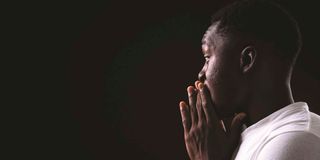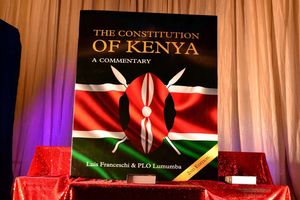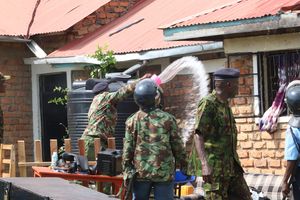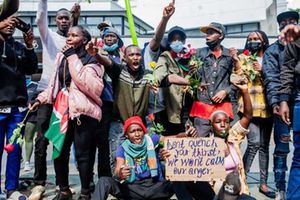
A black man.
There are many social cleavages in life. But one of the most enduring is race, and its corollary, colour. If you have ever been Black for a minute, you know what I mean.
Being poor is another, or female. Religion, ethnicity and other identities can also be the occasion for exclusion or discrimination.
Today, however, I want to focus on what I call the power of Black — that is, the tug and the pull of being Black. If you are born Black, and prima facie look it, then your existence is largely defined by that fact, whether you are rich or poor, male or female, and whatnot. But Black alone is a job. Let me peel your Black eyes.
In the mid-1970s, I was a high school student in the State of Illinois in the United States. Before I went to America, I thought of it as some magical place. To fly in an airplane was itself a miracle – a “White” miracle. I thought of planes as synonymous with Whiteness. It was a wonder, a White wonder. No one, not even my great teachers in grade school in Kenya, had given me any hope that a Black person could have been the progenitor of the flying metal bird. We took off from Embakasi, the old airport, to Field Marshal Idi Amin’s Entebbe, where I trembled with fear, then to Athens, Greece, and finally the mighty JFK in New York.
In Athens, our layover was two days in which I was housed by a White Greek family. I spent two nights with Greek teenagers. Everything in Athens and their life was all new to me. A Kenyan boy had very little in common with children in Greece, except our anatomy.
This was my first introduction to the White world, and to how different it was from the Black world I had left behind. These first encounters with Whiteness were foundational to my thinking. I recall, in particular, the concept of personal space among Whites. I remember too their individualism and their egoism. But they were quick to smile. They were also generous. Their living conditions were much more advanced.
Ill meaning outsider
I vividly recall the Boeing 747 as it circled New York City ready to land. The city was humongous. It made Athens, which I had left behind, seem like a village. New York’s skyscrapers were a marvel to the eye. The bird landed. Our layover was another several days during which I thought New York City would literally swallow me up.
Then off to Chicago and to Fisher High School in an Anglo-Saxon community on the outskirts of Urbana Champaign, the home of the University of Illinois. Here, in an all-White community, I was hosted by a loving White American family. We easily mixed with their teenage children. We played American football, drank coke and ate pizza, and rode bikes.
Then one summer evening as night fell, I took a lonesome stroll in the town. A car pulled up next to me. It was a cop. A burly cop. He stuck out his muscled neck and quietly said, “come here son.” I approached the police cruiser, heart pounding. When I was level with him, with his deep blue eyes, he looked me straight in the eye and said, “son, I wouldn’t be walking alone around here.” He meant that I shouldn’t be “Walking While Black.”
He said people might mistake me for an ill meaning outsider. Then he asked for my address, which I promptly gave him. He drove me straight to my adopted home where he gave them a gentle but scolding lecture and then drove off. That was the last time I took a stroll alone at night so long as I lived in that White neighbourhood.
Black face
I had lived there for a little over three months without seeing another Black face. My school was all-White. I dated White girls. No choice. Then one day we went to the largest mall in the region. There, for the first time in three months, I saw a Black man walking with a Black teen. I was with my White foster family.
Without thinking, I took off towards the Black man. He was tall, very tall – six feet seven inches. His name was Willie Williams. As I approached at full speed, he crouched a little to shorten himself — oblivious to protocol— as I introduced myself. I had been starved of Black people. My White “family” caught up and politely introduced themselves.
Thereafter Willie and his family would pick me up on weekends to go to the movies or football games. They became my family. I tell this story to emphasise the power of Black – whether to repulse, or to pull together like a magnet.
I now know that our history of alienation and subjugation as Black people – wherever we are – gives us Black Power, not powerlessness.
Makau Mutua is SUNY Distinguished Professor and Margaret W. Wong Professor at Buffalo Law School, the State University of New York. He’s Senior Advisor on Constitutional Affairs to President William Ruto. On X: @makaumutua.










